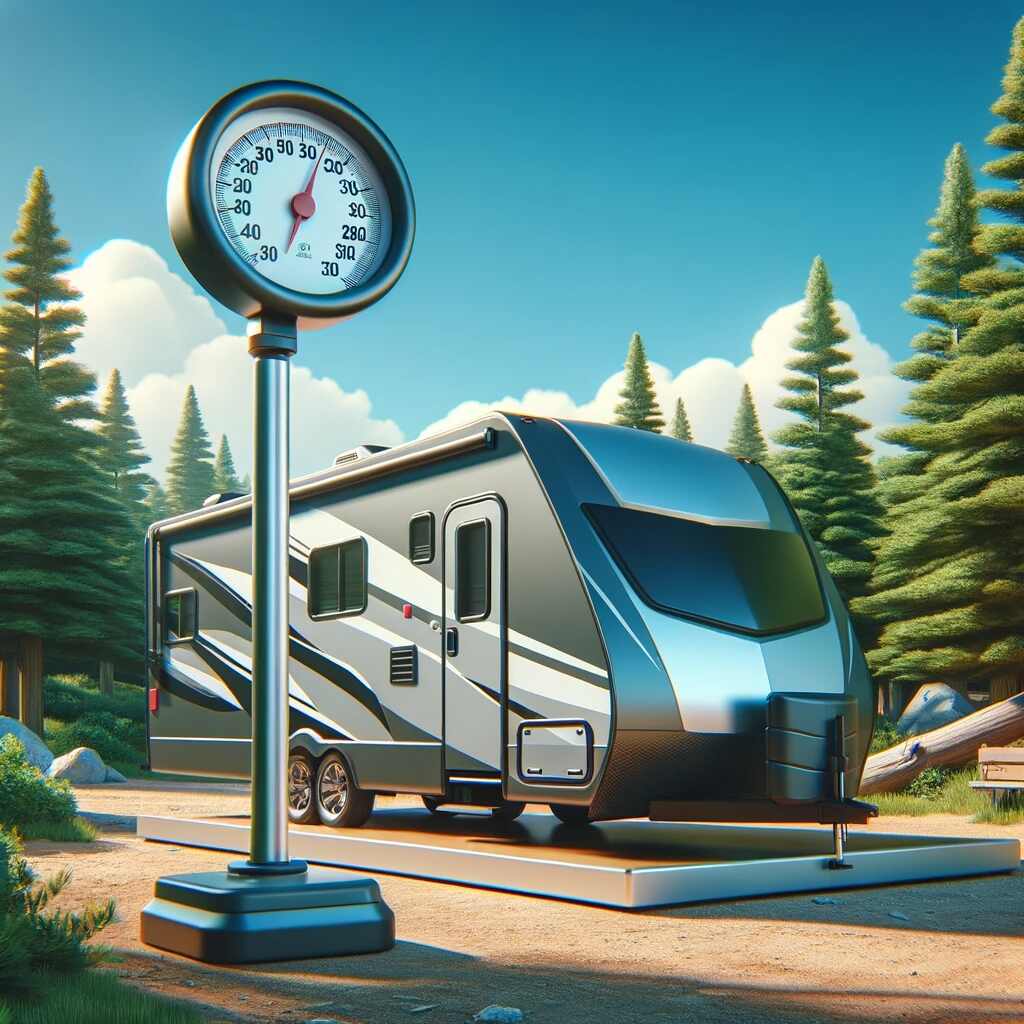If you’re in the market for a 30-foot camper, one of the crucial factors to consider is its weight. Understanding the weight of your camper is essential for safe towing, ensuring your vehicle can handle the load, and complying with road regulations.
Let’s dive into the various aspects of a 30-foot camper’s weight, providing you with the knowledge needed to make informed decisions.
Understanding the Basics
Before we dive into specific camper models and their weights, let’s start with the basics. The weight of a camper can be divided into several categories:
- Dry Weight: This is the weight of the camper when it is empty, without any added water, fuel, or personal belongings. It provides a baseline weight for the camper.
- Gross Vehicle Weight Rating (GVWR): The GVWR is the maximum weight a camper can safely weigh when fully loaded, including all your gear, water, fuel, and passengers. It’s a crucial number to consider to ensure safety on the road.
- Tongue Weight: This is the weight that is exerted on the hitch of your towing vehicle when the camper is attached. It’s important to stay within the manufacturer’s recommended tongue weight limit to maintain vehicle stability.
- Payload Capacity: The payload capacity is the maximum amount of weight your camper can carry, including all your belongings. It’s the difference between the GVWR and the dry weight.
- Axle Weight: This is the weight borne by the camper’s axles. It’s essential to distribute weight evenly to prevent overloading one side.
Now that we’ve covered the basics, let’s explore the weight considerations specific to 30-foot campers.
Average Weight of a 30-Foot Camper
The weight of a 30-foot camper can vary significantly depending on the type, make, and model. However, as a general guideline, a 30-foot travel trailer camper may have a dry weight ranging from 6,000 to 8,000 pounds (2,722 to 3,629 kilograms). Keep in mind that this is a ballpark figure, and the actual weight can be higher or lower based on several factors.
Factors Affecting Camper Weight
Several factors can influence the weight of a 30-foot camper:
1. Type of Camper
There are various types of campers, including travel trailers, fifth-wheel trailers, motorhomes, and more. Each type has a different construction and features, which can impact their weight. For example, fifth-wheel trailers often weigh more than conventional travel trailers of the same length due to their unique hitch design.
2. Construction Materials
The materials used in the construction of the camper can significantly affect its weight. Campers made with lightweight materials like fiberglass may weigh less than those constructed with heavier materials like steel or wood.
3. Features and Amenities
The inclusion of additional features and amenities can increase the weight of a camper. Larger kitchens, bathrooms, slide-outs, and entertainment systems can all add to the overall weight. It’s essential to consider which features are essential to you and balance them with weight concerns.
4. Water and Fuel Tanks
Many campers have built-in freshwater and wastewater tanks, as well as fuel tanks for generators. The weight of these tanks, when full, can significantly impact the camper’s overall weight. Be aware of your camper’s tank capacities and how they affect its weight.
5. Slide-Outs
Slide-outs are sections of the camper that can extend to create additional interior space when parked. While they can enhance comfort, they also add weight to the camper. Consider whether you need slide-outs and how they affect your camper’s weight.
Specific 30-Foot Camper Models and Their Weights
To give you a better idea of the range of weights for 30-foot campers, let’s explore a few specific models from different categories:
1. Travel Trailers
Airstream Classic 30RB:
- Dry Weight: Approximately 7,788 pounds
- GVWR: 9,000 pounds
- Tongue Weight: 1,014 pounds
- Payload Capacity: 1,212 pounds
Jayco Jay Flight 30RBDS:
- Dry Weight: Approximately 7,920 pounds
- GVWR: 11,500 pounds
- Tongue Weight: 810 pounds
- Payload Capacity: 3,580 pounds
2. Fifth-Wheel Trailers
Keystone Montana High Country 330RL:
- Dry Weight: Approximately 11,193 pounds
- GVWR: 14,230 pounds
- Pin Weight: 2,230 pounds
- Payload Capacity: 3,037 pounds
Grand Design Reflection 303RLS:
- Dry Weight: Approximately 10,366 pounds
- GVWR: 13,995 pounds
- Pin Weight: 1,785 pounds
- Payload Capacity: 3,629 pounds
3. Motorhomes
Winnebago Intent 30R:
- Dry Weight: Approximately 16,500 pounds
- GVWR: 18,000 pounds
- Tongue Weight: N/A (applies to motorhomes)
- Payload Capacity: 1,500 pounds
Coachmen Leprechaun 310BH:
- Dry Weight: Approximately 12,600 pounds
- GVWR: 14,500 pounds
- Tongue Weight: N/A (applies to motorhomes)
- Payload Capacity: 1,900 pounds
These examples provide a glimpse into the weights of 30-foot campers from different categories. Keep in mind that these weights are approximate and can vary based on optional features and configurations. Always refer to the manufacturer’s specifications for the most accurate and up-to-date information.
Tow Vehicle Requirements
Now that you have an idea of the weights associated with 30-foot campers, it’s crucial to consider whether your towing vehicle can handle the load. Towing a camper that exceeds your vehicle’s towing capacity can lead to safety hazards and potential damage to your vehicle.
To determine if your vehicle is suitable for towing a 30-foot camper, consider the following factors:
1. Towing Capacity
Check your vehicle’s towing capacity in the owner’s manual or by contacting the manufacturer. The towing capacity should be greater than the GVWR of your camper to ensure safe towing.
2. Tongue Weight Capacity
Confirm that your vehicle’s hitch and tongue weight capacity can handle the tongue weight of your camper. The tongue weight should typically be around 10-15% of the camper’s GVWR.
3. Brake Controller
If your camper has electric brakes, ensure your towing vehicle is equipped with a brake controller to safely control the camper’s braking system.
4. Weight Distribution Hitch
Consider using a weight distribution hitch to evenly distribute the weight between your towing vehicle and the camper. This can improve stability and control while towing.
5. Payload Capacity
Check your vehicle’s payload capacity, which includes the weight of passengers and cargo inside the vehicle. Make sure it can accommodate both your passengers and any additional cargo you plan to carry.
6. Suspension and Cooling Systems
Evaluate your vehicle’s suspension and cooling systems to ensure they can handle the added weight and stress of towing.
If you’re unsure whether your vehicle is suitable for towing a 30-foot camper, consult with a professional or seek guidance from the camper manufacturer. It’s crucial to prioritize safety when towing to prevent accidents and damage.
Tips for Reducing Camper Weight
If you have your heart set on a 30-foot camper but are concerned about weight, here are some tips to help reduce the overall weight of your setup:
1. Travel Light
Pack only essential items and avoid overloading your camper with unnecessary belongings. Consider the weight of each item you plan to bring and prioritize what’s essential for your trip.
2. Use Lightweight Gear
Opt for lightweight camping gear, such as compact cookware, foldable furniture, and lightweight bedding. This can help reduce the payload of your camper.
3. Minimize Water and Fuel
Only fill your camper’s tanks with the necessary amount of water and fuel for your trip. Excess liquids can add a significant amount of weight.
4. Consider Slide-Outs Carefully
While slide-outs can provide extra space, remember that they add weight. Use them judiciously and only when needed.
5. Choose a Smaller Camper
If weight is a major concern, consider downsizing to a slightly smaller camper that still meets your needs. Smaller campers typically weigh less than their larger counterparts.
6. Check Tire Pressure
Maintain proper tire pressure on both your towing vehicle and camper. Underinflated tires can lead to decreased fuel efficiency and handling issues.
7. Regular Maintenance
Keep your camper and towing vehicle well-maintained to ensure optimal performance. This includes servicing the brakes, suspension, and engine.
Legal Considerations
Understanding the legal aspects of towing a 30-foot camper is essential to avoid any legal issues while on the road. Different states and countries may have varying regulations regarding trailer weight, towing equipment, and licensing requirements. Here are some key legal considerations:
1. Driver’s License Requirements
In some regions, you may need a specific driver’s license or endorsement to tow a camper above a certain weight. Check with your local Department of Motor Vehicles (DMV) for information on licensing requirements.
2. Weight Limits
Ensure that your setup complies with weight limits set by local and federal regulations. Exceeding these limits can result in fines and penalties.
3. Trailer Brakes
Many jurisdictions require trailers over a certain weight to have their own braking system. Make sure your camper’s braking system is compliant with local laws.
4. Towing Speed Limits
Some areas may have specific speed limits for vehicles towing trailers, which can be lower than regular speed limits. Be aware of these limits and obey them.
5. Safety Chains and Equipment
Use safety chains, mirrors, and other towing equipment as required by local regulations to ensure safe towing.
6. Road Restrictions
Be aware of any road restrictions, such as weight limits on certain bridges or tunnels, that may affect your route.
To stay informed about legal requirements, consult with local authorities or visit their websites for the most up-to-date information. Ignorance of the law is not an excuse, and compliance is essential for safe and trouble-free travel.
Conclusion
In conclusion, the weight of a 30-foot camper can vary depending on factors like type, make, and features. On average, a 30-foot camper may weigh between 6,000 to 8,000 pounds when dry. However, it’s essential to refer to the specific manufacturer’s specifications for the most accurate weight information.
Additionally, remember to consider your towing vehicle’s capacity, legal requirements, and safety measures when planning your camping adventures. Armed with this knowledge, you can make informed decisions and enjoy your 30-foot camper without worries.








